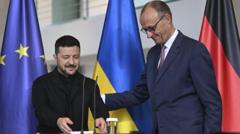The German intelligence agency has officially classified the AfD party as right-wing extremist, citing its exclusionary views on citizens of diverse backgrounds. This designation follows a record electoral success for the party, spotlighting increasing tensions in German politics.
German Intelligence Classifies AfD as Right-Wing Extremist

German Intelligence Classifies AfD as Right-Wing Extremist
The Alternative für Deutschland party faces increased scrutiny as the federal agency labels it as extremist due to its views on ethnicity and nationality.
Germany's Alternative für Deutschland (AfD) party has officially been classified as a right-wing extremist group by the country's federal office for the protection of the constitution (Verfassungsschutz). The agency stated that the party’s emphasis on ethnicity and ancestry is fundamentally incompatible with the principles of a free democratic order.
Following a significant electoral performance in February’s federal elections, where the AfD secured a record 152 seats in the 630-seat parliament with 20.8% of the total votes, the designation marks a notable shift in how the party is perceived by state authorities. As the Bundestag prepares to vote on conservative leader Friedrich Merz as chancellor, the AfD’s previously unassailable position continues to be scrutinized.
The intelligence agency, which has already placed the AfD under observation due to suspicions of extremism, found that its views on citizenship do not recognize individuals from "migration backgrounds from predominantly Muslim countries" as equal members of the national community. This perspective has heightened concerns within Germany regarding the party's influence and intentions.
Nancy Faeser, the outgoing Interior Minister, justified the agency's decision as being based on an exhaustive review process, asserting that it was free from political pressures. The new classification empowers German intelligence to more readily employ informants and surveillance techniques to monitor the party’s activities, potentially reshaping the landscape of German political discourse.
With the far-right historically marginalized in German politics, this classification raises questions about present and future dynamics in the country’s political scene. As debates continue, experts ponder whether this shift may reflect an unprecedented tolerance for the far-right ideologies that have previously been sidelined.






















